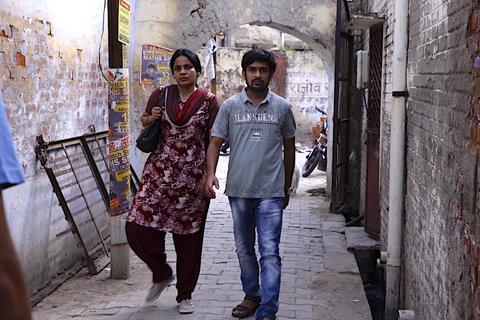The ugly cycle of domestic violence shadows Kanu Behl’s second feature

Director: Kanu Behl. India. 2023. 132mins
Kanu Behl’s directorial debut Titli (Butterfly), which played in Un Certain Regard in 2014, revolved around an oppressive patriarchal family in which the titular youngest son tried hard to find individual liberation from the violent, irredeemable, and gloomy fold. In his second feature Agra, which plays in Directors’ Fortnight, Behl continues to dwell on India’s patriarchal reality; this time through the prism of a volatile, sexually repressed young man. But while this may be the character study of a frustrated man, it’s the gutsy, intrepid and sensible women who surround him, and who refuse to give in to his toxicity, who walk away with the audience’s admiration.
The audience ends up feeling as claustrophobic and desperate as the characters on screen.
Behl is in no mood to make this story palatable. The opening sets the tone with shocking, no-holds-barred food and sexual imagery; hunger, lust and hallucinations make up this portrayal of a disturbing family. It’s this boldness that should help Agra travel further on the festival and arthouse circuit following its Cannes premiere.
Set in Agra in Uttar Pradesh, known to the world as being the home of the Taj Mahal, the film does not engage with the city’s burnished past, history, art and architecture – rather it exposes its suffocating, shabby underbelly. This is a story about the marginalised, the outliers. It’s a reflection of the reality of many similar towns in India, where people do have aspirations and desires but are hemmed in by a lack of opportunities.
One such person is Guru (Mohit Agarwal), a single call centre employee who lives with his parents and has sexual fantasies about his office colleague and dreams marrying her, but looks to dating apps and online sex to indulge his cravings. He shares a room with his bitter mother (Vibha Chibber), while his overbearing father (Rahul Roy) lives with his second wife, Aunty (Sonal Jha), in the upper storey of the same house. Like toxic relationships, the house also becomes an object of contest. Guru is not just in a dysfunctional family situation, but a pathological one.
The film does lay bare the fact that Guru’s tyrannical father — his betrayal of Guru’s mother and the collapse of the family bonds, as well as possible sexual abuse — may have led to Guru’s psychological breakdown. Even though Agra is narrated from his point of view, however, it is tough to give him any validation. A victim of violence and violation, he perpetuates the same with his own latent, and at times unbridled, aggression. Having been preyed upon, he becomes a predator himself. It is like his family legacy has warped him, but he becomes its carrier as well — passing it from one generation to the next.
While Guru might become precisely that which he is a victim of, the women in his life carve their own way out of injustices, instead of wallowing in them. So, the older, physically challenged Priti (Priyanka Bose) might eventually become an outlet for Guru’s sexual gratification but, in turn, she also uses him as a way out from her limited life.
Yet for its convoluted set up, the film’s finale appears too pat, the resolution easy and unconvincing. Despite this, the characters are developed well and have complexity to them, and the terrific ensemble cast elevates the film; particularly Bose, Agarwal and Roy, the loverboy in the 1990 superhit Hindi romance Aashiqui, who makes a surprise, uncharacteristic return as the father.
The real stars of the film are, however, production designer Parul Sondh and cinematographer Saurabh Monga. Sondh works with the vertical architecture, closed spaces, narrow lanes, and small dingy homes, with Monga’s camerawork helping to creating a doleful constraining vibe through the setting. It is a compliment to their craft, and the film at large, that the audience ends up feeling as claustrophobic and desperate as the characters on screen.
Production Company - Saregama India Ltd
International sales - Saregama India Ltd, Sahil.sharma1@rpsg.in
Producers: Vikram Mehra, Siddarth Anand Kumar
Screenplay: Kanu Behl, Atika Chohan
Cinematography: Saurabh Monga
Production design: Parul Sondh
Editing: Samarth Dixit, Nitesh Bhatia
Music: Karan Gour
Main: Mohit Agarwal, Priyanka Bose, Vibha Chibber, Rahul Roy, Aanchal Goswami, Sonal Jha, Ruhani Sharma















![[L-R]: Amanda Villavieja, Laia Casanovas, Yasmina Praderas](https://d1nslcd7m2225b.cloudfront.net/Pictures/274x183/6/4/1/1471641_pxl_20251224_103354743_618426_crop.jpg)








